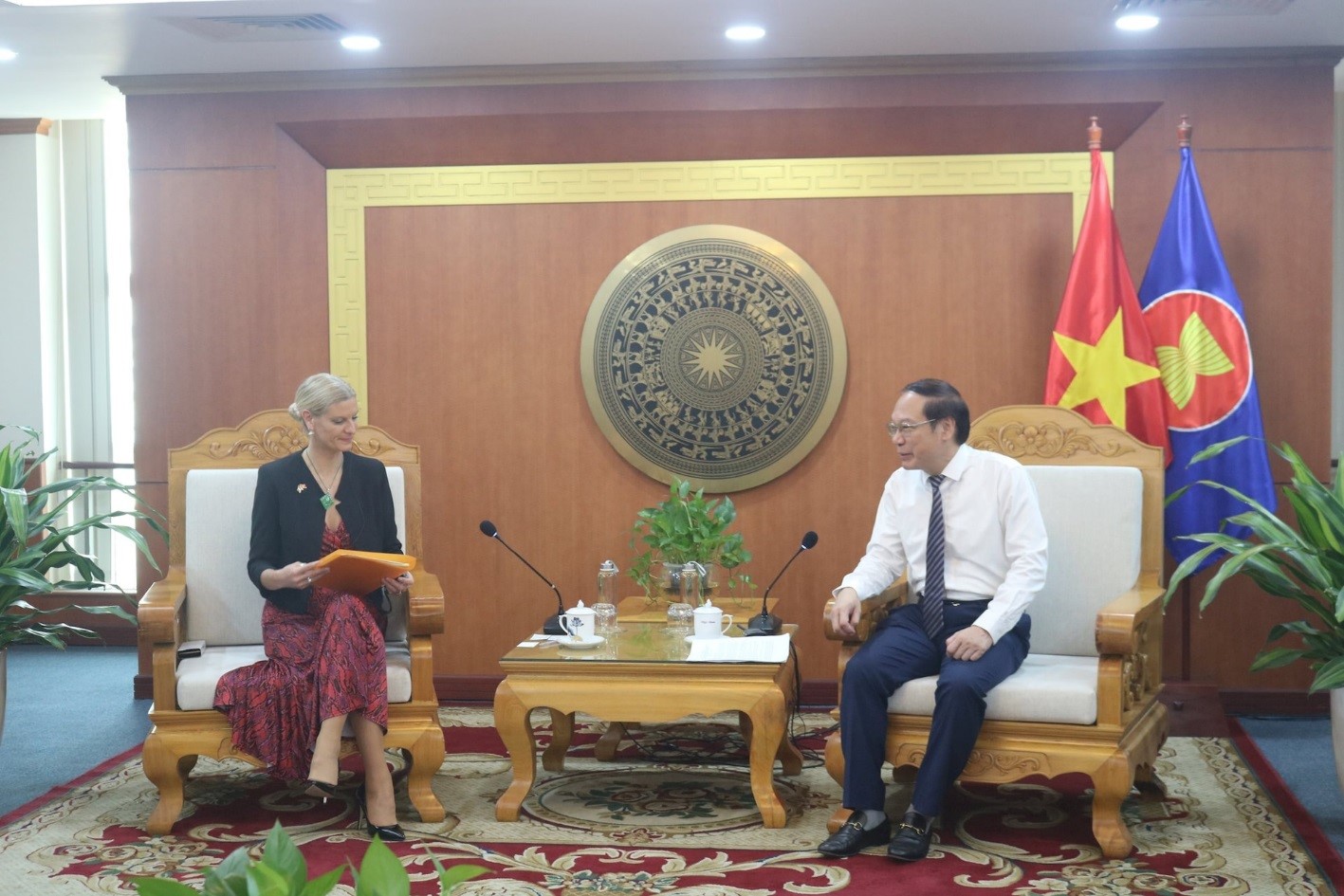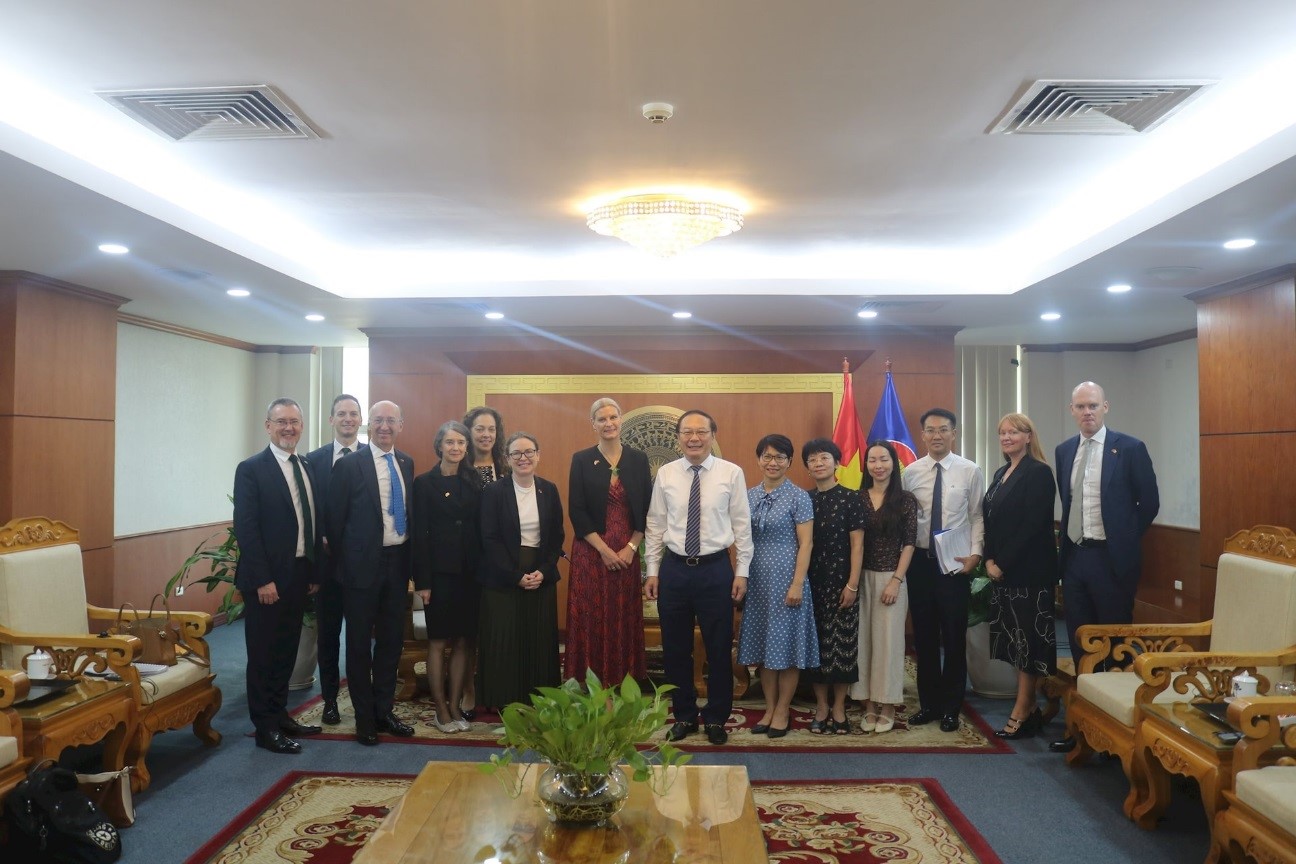As an agricultural country affected by climate change, Ireland wishes to cooperate, share experiences and support Vietnam in developing sustainable agriculture to respond to and adapt to extreme weather events.
The above comment was made by Ms. Pippa Hackett, Secretary of State for the Ministry of Agriculture, Food and the Oceans of Ireland, at a working session with Deputy Minister of Natural Resources and Environment Le Cong Thanh on October 10.
Welcoming the Irish delegation for a visit and work, Deputy Minister Le Cong Thanh said that the Ministry of Natural Resources and Environment of Viet Nam is in charge of many different fields, including fields related to resources such as land, water, environment, climate change, etc. The fields under the Ministry's responsibility have been receiving attention and close cooperation from international partners. Today's meeting is also an opportunity for the Ministry of Natural Resources and Environment of Vietnam to strengthen relations with Ireland in general and the Ministry of Agriculture, Food and Oceans in particular to implement cooperation activities in the coming time.
Following Deputy Minister Le Cong Thanh, Ms. Pippa Hackett said that Ireland and Vietnam have a close and friendly relationship in responding to climate change. This is also an issue that is affecting every country in the world. Therefore, Ireland wishes to strengthen cooperation with Vietnam, sharing experiences in sustainable agricultural development to support Vietnam in achieving its climate goals.
 Deputy Minister Le Cong Thanh received and worked with Ms. Pippa Hackett, Secretary of State for the Ministry of Agriculture, Food and the Oceans of Ireland
Deputy Minister Le Cong Thanh received and worked with Ms. Pippa Hackett, Secretary of State for the Ministry of Agriculture, Food and the Oceans of Ireland
Sharing about Viet Nam's efforts to reduce emissions in the agricultural sector, Deputy Minister Le Cong Thanh said that Viet Nam's agricultural sector is implementing a project to develop 1 million hectares of high-quality, low-emission rice. This is also one of the few projects in the world focusing on low-emission rice cultivation. With its assigned role and tasks, the Ministry of Natural Resources and Environment is working with the Ministry of Agriculture and Rural Development to develop policies and legal regulations to facilitate the project implementation process.
In addition, Viet Nam is making efforts to manage land, protect forests, and increase the ability to absorb carbon emissions. Currently, Viet Nam has many projects to develop forest carbon credits. The Ministry of Natural Resources and Environment is working with relevant ministries and sectors to develop policies and regulations on carbon credits and carbon markets.
Specifically, according to the plan, in 2025, Viet Nam will begin piloting a carbon market. This will be a new playground, helping parties involved in building a circular, low-emission economy have more motivation to develop. Therefore, the Deputy Minister of Natural Resources and Environment hopes that in the coming time, Ireland, a developed agricultural country, will accompany and share experiences with Vietnam on these issues.
Regarding sustainable food production, Deputy Minister Le Cong Thanh assessed that this will be an area where Viet Nam and Ireland have a lot of room to exchange and cooperate with each other.
 Irish delegation and delegation of the Ministry of Natural Resources and Environment at the working session
Irish delegation and delegation of the Ministry of Natural Resources and Environment at the working session
For Viet Nam, sustainable food production requires high-tech processes. Viet Nam has not yet conducted a greenhouse gas inventory for the livestock industry because it is a relatively small industry. However, there is a roadmap for future inventory. Many large beef and dairy producers in Viet Nam, such as Vinamilk and TH Milk, are starting to pay attention to sustainable technological processes.
Regarding circular economy and ecological economy, these are relatively new concepts to Viet Nam. Therefore, Viet Nam still lacks mechanisms, policies, and laws on circular economy and ecological economy. These issues have been mentioned in Viet Nam's laws and regulations, but they are only orientational in nature and do not have specific regulations. Therefore, Deputy Minister Le Cong Thanh hopes that Ireland will continue to exchange and cooperate with Viet Nam in the coming time to support the development and construction of circular economy.
Specifically addressing the issue of food waste treatment, Deputy Minister Le Cong Thanh said that Viet Nam now has cities with a population of 10 million such as Ho Chi Minh City and Hanoi. Therefore, the issue of using and treating food waste in a circular economy plays a very important role. According to the Law on Environmental Protection, from January 1, 2025, Viet Nam will begin to classify waste at source. This is a good premise to solve the problem of environmental protection and waste treatment, including food waste treatment.
Acknowledging the comments of Deputy Minister Le Cong Thanh, Ms. Pippa Hackett said that Ireland highly appreciated Viet Nam's 1 million ha low-emission rice project. Sharing experiences from Ireland, over the past 3 years, Ireland has implemented emission reduction activities in the agricultural sector such as using smart fertilizers, circulating livestock production, managing mineral resources, exploiting and cultivating sustainably to minimize the impact of climate change and reduce the impact on soil.
In addition, Ireland has also implemented activities to support farmers in many different ways, including support in technology, technical standards for farms... to effectively reduce agricultural emissions. Up to now, more and more Irish farmers are choosing organic agriculture. Ms. Pippa Hackett said that Ireland is willing to support Vietnam in these efforts to develop sustainable agriculture to adapt to climate change.